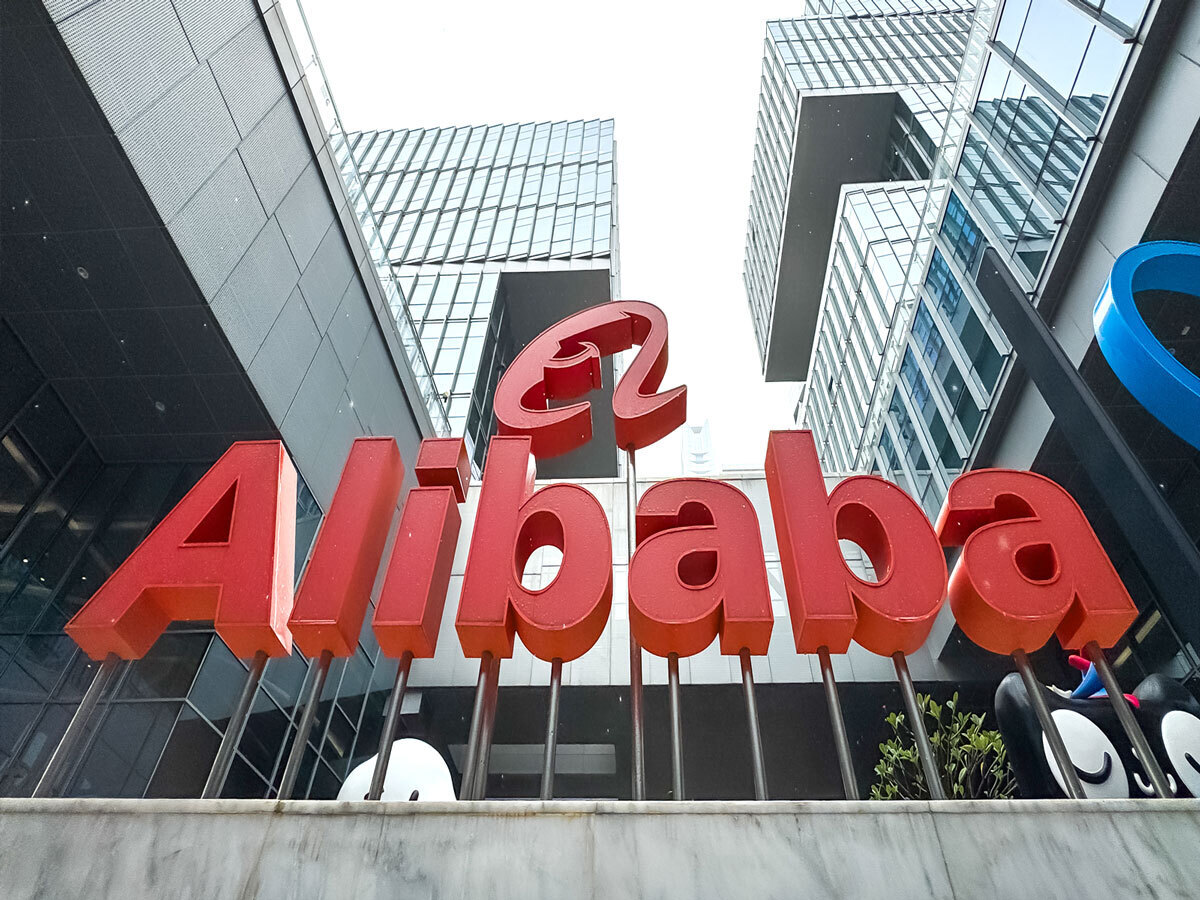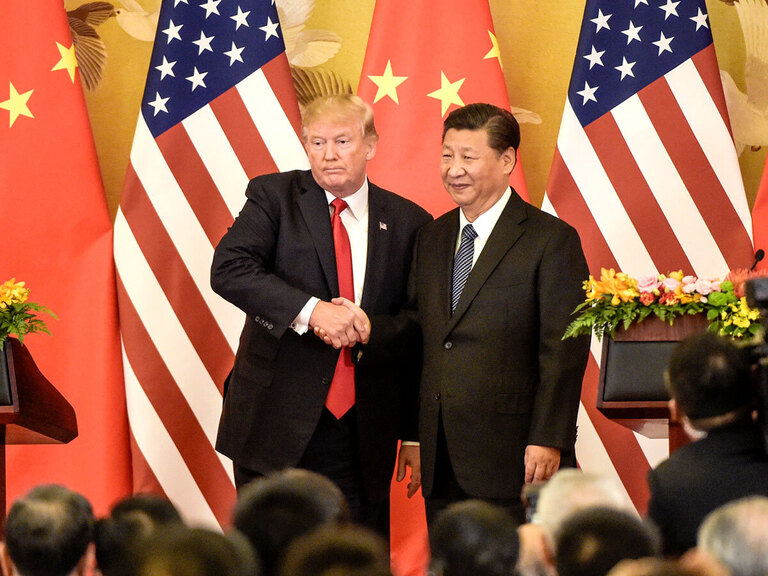Alibaba Group [BABA] is a Chinese e-commerce company that has grown to encompass five other major business groups, among them cloud computing and artificial intelligence (AI).
The Hangzhou-based firm enjoyed a stellar start to 2025, topping a three-year high and outperforming the ‘magnificent seven’ in the first four months of the year.
This stock spotlight will discuss the latest developments and events that have helped the BABA share price rise in 2025. It will also examine the company’s financial health, compare BABA stock against its peers and highlight key factors for the stock ahead of its earnings release on May 15.
Targeting AI Growth
In the tail end of 2024, Alibaba circulated an internal memo revealing a two-pronged approach to drive growth by focusing on e-commerce and AI technology.
In recent years, Alibaba’s e-commerce dominance in China has faced intense competition from domestic rivals such as PDD Holdings [PDD] and JD.com [JD]. The company hopes that AI solutions can synergize with its core e-commerce business to improve customer experience and retain users.
It has also been working on partnership deals with consumer tech companies to reach new customers. In May 2025, Alibaba partnered with social media platform RedNote — widely considered the Instagram of China — to allow RedNote users to click links that direct them to Alibaba’s Taobao online shopping platform.
Investors were most excited about Alibaba’s AI partnership deal with Apple [AAPL]. In mid-February 2025, Alibaba’s Chairman Joe Tsai announced Apple had selected Alibaba to support iPhones AI services in China.
Although Tsai did not disclose whether Alibaba would be Apple’s sole AI partner, the news was enough to help BABA stock rally through to the end of February.
Later that month, Alibaba revealed plans to invest at least RMB380 billion over the next three years to advance cloud computing and AI infrastructure.
Had it not been for the US-China trade tensions that flared in April 2025, BABA stock may well have remained near its three-year high of $148.43. Investors have since grown more cautious over the impact of potential tariffs on Chinese imports to the US. There have also been calls to delist Chinese companies from the US.
In August 2024, dual-listed Alibaba converted its primary listing to Hong Kong from New York.
BABA Surges to Three-Year High
Alibaba’s share price has rebounded after bottoming at $80.06 in mid-January 2025. Positive news related to partnership deals and strong Q3 earnings helped the stock surge 83.45% by mid-March.
April saw BABA stock fall around 35% from this peak, although it has recovered since as the two trading partners move towards a detente.
As of May 12, BABA stock was up 56.33% in the year to date, and up 69.20% in the past 12 months.
The Chinese e-commerce heavyweight’s share price is down 58.49% from its all-time high of $319.32, recorded in November 2020.
Alibaba Reports Strong Earnings Growth
In Q3 2024, Alibaba reported an 8% year-over-year increase in revenue to RMB280.15bn, beating market expectations. Revenue growth was supported by strong performance of its domestic and international e-commerce operations.
The company’s cloud computing business recorded a 13% year-over-year increase in quarterly revenue to about RMB31.74bn. AI-related product revenue posted a triple-digit year-over-year growth for the sixth consecutive quarter, Alibaba said.
E-commerce operations accounted for nearly half of Alibaba’s quarterly revenue, while cloud computing and AI contributed about 11% of the company’s revenue during the period.
Quarterly non-GAAP net income came in at about RMB51.07bn, a 6% increase over the same quarter in 2023.
Alibaba recorded free cash flows of about RMB39.02, 31% lower than a year ago, due to investment in cloud infrastructure.
BABA vs PDD vs JD
| BABA | PDD | JD |
Market Cap | $321.90bn | $165.22bn | $52.17bn |
P/E Ratio | 19.25 | 11.08 | 9.71 |
P/S Ratio | 2.39 | 3.16 | 0.35 |
PEG Ratio | 4.56 | 1.94 | 1.27 |
Estimated Sales Growth (Current Fiscal Year) | 6.36% | 20.42% | 8.33% |
Estimated Sales Growth (Next Fiscal Year) | 7.42% | 18.77% | 5.41% |
Source: Yahoo Finance
BABA Stock: The Investment Case
The Bull Case for Alibaba
Over the last five years, Alibaba has faced intense regulatory scrutiny at home, marked by a record fine of $2.75bn imposed by China’s anti-monopoly regulator in 2021. Now the tides seem finally to be turning in favor of the e-commerce giant.
In March 2025, Beijing unveiled a special plan to increase domestic consumption to shield its economy from the trade war with Washington. The pro-growth plan aims to increase Chinese domestic income and encourage household spending, which is expected to support Alibaba’s core e-commerce operations.
Alibaba’s efforts to expand its AI capabilities have fueled investor optimism. The partnership with Apple serves as a vote of confidence that Alibaba’s AI offerings can rival those of OpenAI and DeepSeek.
Notably, Alibaba views AI as a key tool to improve the online shopping experience for both merchants and consumers, which could give its e-commerce platforms an edge amid fierce domestic competition.
“Beijing has pivoted to pro-growth policies, Alibaba’s core commerce business is stabilizing and its AI investments are paying off. The result is a stock that investors can’t ignore anymore,” said Charu Chanana, Chief Investment Strategist at Saxo Bank, in a research report.
The Bear Case for Alibaba
Intense domestic competition is a major obstacle in Alibaba’s growth story. Alibaba investors fear the company may never regain the dominant position it once held in China following regulatory crackdowns over its monopolistic practices.
In May 2025, Morningstar senior equity analyst Chelsey Tam noted that Alibaba is steadily losing market share to rivals PDD and Douyin, with no “quick fix in the near term.” Tam added that Alibaba’s annual active consumer number is “close to the ceiling in China.”
Away from home, US delisting fears continue to unnerve investors. In May the Financial Times reported that heads of two Congressional panels urged the US Securities and Exchange Commission to delist Chinese companies, including Alibaba, citing national security risks.
Conclusion
Alibaba showed strong momentum in early 2025, supported by strategic AI investments, key partnerships and strong e-commerce performance. Support from China’s pro-growth policy and rising AI revenues have contributed to investor optimism.
However, fierce domestic competition and ongoing Sino-US tensions pose significant hurdles to future growth. Investors must weigh whether Alibaba’s current market valuation justifies the associated risks.
Disclaimer Past performance is not a reliable indicator of future results.
CMC Markets is an execution-only service provider. The material (whether or not it states any opinions) is for general information purposes only, and does not take into account your personal circumstances or objectives. Nothing in this material is (or should be considered to be) financial, investment or other advice on which reliance should be placed. No opinion given in the material constitutes a recommendation by CMC Markets or the author that any particular investment, security, transaction or investment strategy is suitable for any specific person.
The material has not been prepared in accordance with legal requirements designed to promote the independence of investment research. Although we are not specifically prevented from dealing before providing this material, we do not seek to take advantage of the material prior to its dissemination.
CMC Markets does not endorse or offer opinion on the trading strategies used by the author. Their trading strategies do not guarantee any return and CMC Markets shall not be held responsible for any loss that you may incur, either directly or indirectly, arising from any investment based on any information contained herein.
*Tax treatment depends on individual circumstances and can change or may differ in a jurisdiction other than the UK.
Continue reading for FREE
- Includes free newsletter updates, unsubscribe anytime. Privacy policy





